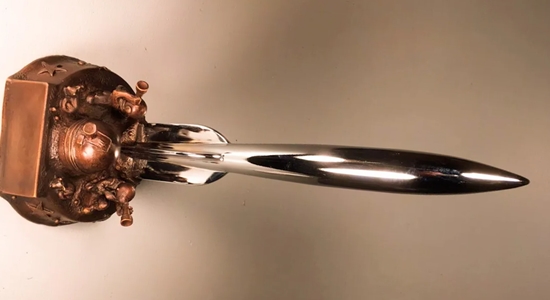
The Hugo Awards for distinguished achievement in science fiction and fantasy have again fallen sway to corruption. What exactly is going on has yet to be confessed. But there are clues.
The Hugo Awards are distributed annually at the Worldcon Science Fiction Convention, or Worldcon. It has been held in various places around the globe.
In 2023, Worldcon was held in Chengdu, China. In 2021, when the venue for 2023 was being decided, “some concerns” were raised about letting the convention go to China, notes FanSided’s Daniel Roman (“Controversy at the Hugo Awards: Works deemed ‘ineligible’ lead to censorship speculation,” January 23, 2024). Writers signed an open letter condemning the choice.
These concerns, Roman writes, pertained to “China’s ongoing treatment of its Uyghur population and the potential for the country’s strict censorship laws to interfere with the con.”
Fast forward to October 2023, and the convention went off seemingly without a hitch…. But now that the Hugo Awards nomination data has been released, it’s raising some serious questions in the fantasy and science fiction community. Some works and authors were mysteriously deemed “ineligible” for awards with no reason given, despite being clearly shown to have received enough nominations to nab them finalist slots. The stats themselves also seem questionable; in a few instances the numbers listed exceed the total number of ballots cast, and there is an abnormal “cliff” in the data between the frontrunners in each category and the rest of the pack that is markedly different than previous Hugo voting years.
Perhaps most tellingly of all, these statistics were released on the last possible day that the World Science Fiction Society (WSFS) rules allowed, 90 days after the convention.
The nomination statistics are usually released a few days or a few hours after the convention.
Among the inexplicably disqualified works was the novel Babel by R.F. Kuang, determined to be ineligible for Best Novel. In 2023, Babel won both the Nebula Award and the Locus Award, two other longstanding awards conferred for achievement in science fiction and fantasy.
Episode 6 of the “Sandman” series, “The Sound of Her Wings,” was deemed ineligible for the Short Form short list despite a sufficiency of nominating votes. (The series as a whole was disqualified based on a known rule governing eligibility that when “any series and a subset series thereof both receive sufficient nominations to appear on the final ballot, only the version which received more nominations shall appear.”)
Another shocker from the nomination data was that Iron Widow author Xiran Jay Zhao was deemed “ineligible” for the Astounding Award. That’s the award given out to new authors, and they’re only eligible for it during their first two years after publishing their first story. Zhao’s debut book Iron Widow [was] released in 2021, which means she should have been eligible for the Astounding Award at the 2022 and 2023 Hugos…. As with Kuang, Zhao had not been contacted and had no idea she was deemed “ineligible” until the nomination data was released publicly over the weekend.
At BookRiot.com, Jenn Northington writes:
[Dave] McCarty is the only member of the [Hugo] committee who has made statements at the time of this post’s writing, and most of them have been vague at best, dismissive and rude at worst. Theories, of course, are flying every which way, and most of them allege deliberate wrongdoing…. The Sandman episode was [disqualified] because it had ghosts in it; Kuang was declared ineligible because she might give a speech in Chinese; McCarty was influenced by the Chinese government, or covering for Chinese committee members who could be subject to repercussions. None of these theories explain everything, and none are backed up by much evidence at the moment, which only means that the theories continue to be varied and wide-ranging.
At her blog, Cora Buhlert writes:
The seemingly random ineligiblity is believed to be due to the affected nominees being considered politically undesirable in China, especially since two of the affected nominees, R.F. Kuang and Xiran Jay Zhao, are American and Canadian Chinese, respectively. However, nothing I have read by R.F. Kuang suggests that she would be overly likely to criticise the Chinese government. Plus, we have other Chinese diaspora finalists on the ballot who were not declared ineligible. Nor does this explain why Paul Weimer or The Sandman or “Fogong Temple Pagoda” were declared ineligible.
Buhlert later added: “One of Xiran Jay Zhao’s books apparently has [a] Uyghur main character, which would explain why [she] might be considered undesirable.”
Yes. Yes it would.
The effort to get to the bottom of things isn’t helped by “she/her Nebula&Hugo-nommed queer Bengali geek / gamer / editor / writer / dice&jewelry maker” Nibedita Sen’s racial attack on the Worldcon organization and on Hugo Award committee member Dave McCarty. She/her contends that “the WSFS exists to protect white men like him,” and the nature of this assertion apparently didn’t bother other participants in the thread. Of course, the record shows that persons of any race can be evasive, dishonest, and arbitrary in the exercise of power. What has McCarty’s color got to do with all this? But in 2023, certain people pretend that racism is not really racism when directed against persons of pallor.
It is unlikely that the necessity of appeasing the Chinese Communist Party had nothing to do with the various mysterious exclusions of Chinese writers, although other motives, and incompetence, may also help explain the committee’s actions. What we know for sure is that foreign organizations cannot do their thing in excursions to modern China without paying attention to and obeying the CCP. Which censors.
Carmakers know this. Moviemakers know this. And now, one must hope, bestowers of literary awards know this.





